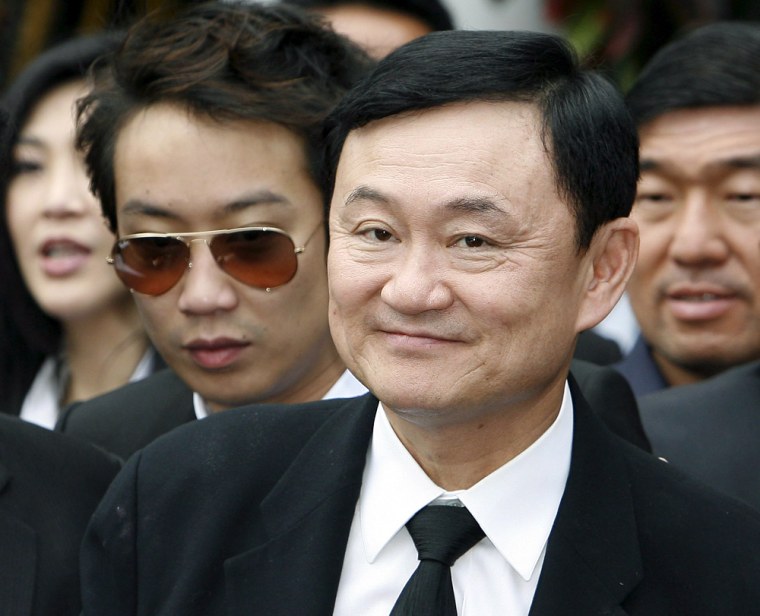Deposed Thai Prime Minister Thaksin Shinawatra returned Thursday from 17 months in exile to face corruption charges, saying he hopes to restore his reputation following his ouster. Police immediately took him into custody.
Thousands of supporters — many dancing, beating drums and singing — gathered at Suvarnabhumi International Airport for his arrival aboard a Thai Airways flight from Hong Kong.
But Thai authorities quickly detained the 58-year-old billionaire politician and he was driven to the Supreme Court to face charges against him.
Thaksin was deposed in a September 2006 coup and had lived abroad ever since. He had expected to face arrest after arriving on charges of graft and abuse of power during his 2001-2006 time in office.
His return was seen as a test of the country's political stability, with critics warning that the populist billionaire's homecoming could plunge the country into renewed crisis.
Police Lt. Gen. Prung Bunpadung said about 1,000 police were being deployed at the airport, along Thaksin's route of travel and places he is expected to visit during the day.
No politics — 'I'm finished'
Before boarding the plane in Hong Kong for the last leg of his journey home, Thaksin said, "I believe in the Thai justice system, especially the court system. Normally in justice systems everywhere, a person is innocent until proved guilty."
He said that he was a "little bit" concerned about his security. But he added that there was little chance his return would spark violence.
"I used to say when I was prime minister that there were attempts to assassinate me. Normally I would have some concerns but I hope that everyone is thinking of national reconciliation and they will prepare (security measures) for me well," he said.
Thaksin repeated his pledge to stay out of politics — something neither his fans or foes believe.
"I'm finished," he said.
Coup while Thaksin was abroad
Thaksin was stripped of power 17 months ago when the army staged a coup during one of his trips abroad, and he has since lived in exile. He returns home several weeks after a government sympathetic to him replaced a military-appointed interim regime.
The People's Power Party, which is packed with Thaksin allies, won Dec. 23 general elections and now leads a six-party coalition government. Prime Minister Samak Sundaravej, who heads PPP, won widespread support by campaigning as Thaksin's proxy and pledging to clear his name.
Thaksin and his wife, Pojaman, face corruption and conflict of interest charges in connection with her purchase of prime Bangkok real estate from a state agency in 2003, while he was prime minister. Pojaman returned to Thailand in January and was released on bail pending trial.
Thaksin, a former telecommunications magnate, also faces separate charges of concealing assets.
Speaking to journalists in Hong Kong on Wednesday, Thaksin called the charges against him "unjust, unfair allegations" that were "cooked up by my political enemies."
"The country has returned to democracy, so I want to go home ... I miss my motherland," he said Wednesday, speaking to Thai Public Broadcasting Service television from a Hong Kong shopping mall.
Fears of 'a greater crisis'
The former prime minister inspires fear and loathing among his critics, and his return could re-ignite the deep political divisions that led to his downfall.
"Thaksin will plunge the country into a greater crisis that people will not be able to tolerate any longer," said former Bangkok governor and onetime Thaksin ally Chamlong Srimuang.
Thaksin enjoys support among rural people, who appreciated his financial and social welfare policies. But he is deeply resented by the urban elite for his autocratic ways and allegedly mass corruption under his regime.
Some of his old opponents are threatening new protests against him. Months of strident anti-Thaksin demonstrations in Bangkok culminated in the Sept. 19, 2006, military coup that toppled him while he was abroad.
His return marks an impressive comeback. His London-based exile was eased by his fortune, earned in telecommunications, and he kept himself in the spotlight by buying Britain's Manchester City soccer club.
The forces that helped unseat Thaksin — the military, Bangkok's educated middle class and the country's elite, including people associated with the country's monarchy — worked hard to erase Thaksin's political legacy.
